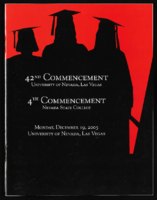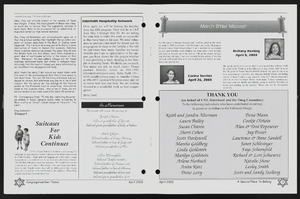Search the Special Collections and Archives Portal
Search Results

Nicole Charlton oral history interview: transcript
Date
Archival Collection
Description
Oral history interview with Nicole Charlton conducted by Barbara Tabach on May 23, 2018 for the Remembering 1 October Oral History Project. In this interview, Charlton discusses her early life in Carlin, Nevada and relocating to Las Vegas, Nevada in 1990. Charlton is the Executive Secretary to the Clark County Coroner John Fudenberg and was among the first from the Coroner's office on the scene of the Route 91 shooting in Las Vegas.
Text

University of Nevada, Las Vegas (UNLV) 42nd commencement, Nevada State College 4th commencement program
Date
Archival Collection
Description
Commencement program from University of Nevada, Las Vegas Commencement Programs and Graduation Lists (UA-00115).
Text

Transcript of interview with Helen Smith by Emily Powers, March 4, 2008
Date
Archival Collection
Description
Helen Smith, born and raised in New Jersey, came to Las Vegas in 1956. She intended to visit relatives for a couple of weeks, but ended up staying. Her aunt convinced her to interview at Southern Nevada Memorial Hospital (SNMH) and Helen worked there for a year. She recalls three hospitals at that time: SNMH, the Eighth Street Hospital, and St. Rose de Lima in Henderson. Helen worked in the emergency room back east, so it was natural for her to start in the newly opened ER at Southern Nevada. She recalls treating many victims of accidents on the "Widow Maker", or route 95 to the Test Site, and compares the more advanced treatment and staffing back east with the Las Vegas small-town conditions. In talking about the medical advances she has seen over the years, Helen gives a detailed explanation of autoclaving, describes the duties of an ER nurse, and mentions the shifts that nurses used to work. She also discusses her own progression from relief nurse to day nurse to supervisor, and comparisons are made between hospital stays 30 and 40 years ago to hospital stays today. Helen refers to doctors and nurses that she worked with or knew of, talks about the types of things children were treated for, and shares several anecdotes and stories of patients and their treatment. She also expounds further on her work history at Sunrise Hospital, with her husband in their air-conditioning business, and as case manager for SIIS in workman's compensation. As Las Vegas grew in population, a process which started in the sixties, Helen notes that more specialists were attracted to local hospitals. She shares her own more recent experience as a patient and gives her opinion on the use of ERs for general care rather than true emergencies. Her closing remarks include descriptions of changes in nurses' responsibilities and comments on her husband's work with the Children's Shrine in telemedicine.
Text

Transcript of interview with Morris "Moe" Dalitz by Brenda Baxter, November 4, 1977-March 30, 1978
Date
Description
Interview with Morris "Moe" Dalitz by Brenda Baxter, on several dates in late 1977 to early 1978. In this interview, Dalitz talks about his business and career endeavors before coming to Las Vegas, which included a laundry service and military service. Dalitz partnered with Wilbur Clark and became a successful hotel and casino owner in Las Vegas, as well as a real estate developer with properties including the Boulevard Mall and Sunrise Hospital.
Moe Dalitz was born in Boston in 1899, and soon after his family moved to Detroit, Michigan and where his father started a linen supply company. In 1930, during Prohibition, Moe moved to Cleveland, Ohio and he became involved with the then-illegal liquor business. At the age of 41, Dalitz enlisted in the Army and was stationed at Governors Island. Moe was put in charge of laundries and dry cleaning because of his experience in the laundry business. He played an important role in creating mobile laundry units that were used in the front lines in North Africa. His ingenuity won him a non-combatant award for his "unusual interest, ingenuity and talents" applied during his service. At the end of war, Moe returned to Cleveland, where his partners were successfully carrying on their business. It was then that they decided to go into the casino-nightclub business, opening nightclubs in Ohio and Kentucky. A couple years later, Moe and his partners met Wilbur Clark and agreed to finance his inactive project in Las Vegas. Thus, in 1950, the Desert Inn Hotel and Casino opened, and Moe Dalitz ushered in a new era for the city. Moe and partners continued to elevate the sophistication of the Strip when they acquired the operating lease to, and later part ownership of, the Stardust Hotel and Casino. Moe was instrumental in bringing the French Lido de Paris show to the Stardust, which was considered the most spectacular nightclub show produced in Las Vegas at its time. In addition to his gaming industry ventures, Moe engaged in significant real estate development, along with partners Allard Roen, Merv Adelson and Irwin Molasky. Their projects included Sunrise Hospital, The Boulevard Mall and Las Vegas Country Club as well as La Costa Resort and Spa in California. At the time of the interview, Moe was involved with the construction of a downtown hotel and casino. Moe Dalitz was the recipient of the Humanitarian Award from the American Cancer Research Center, and supported the Variety Club and the Home of the Good Shepard, amongst other charities.
Text

Interview with William Byron Beam, January 20, 2005
Date
Archival Collection
Description
Text

Interview with Raymond Chester Harbert, July 14, 2005
Date
Archival Collection
Description
Text
Minutes from Temple Beth Sholom Board of Directors meetings, January 1957 - April 1963
Date
Archival Collection
Description
The meeting minutes of the board of directors of Temple Beth Sholom, then known as the Jewish Community Center of Las Vegas, Inc., include the proceedings of meetings held from 1957 to 1963.
Text

Interview with Charles Costa, February 13, 2009
Date
Archival Collection
Description
Text

Timothy Dickhudt oral history interview: transcript
Date
Archival Collection
Description
Oral history interview with Timothy Dickhudt conducted by Barbara Tabach on March 13, 2018 for the Remembering 1 October Oral History Project. In this interview, Timothy Dickhudt discusses his move to Las Vegas, Nevada in 2017 for a fellowship at the University Medical Center in Southern Nevada (UMC). He describes the night of the October 1, 2017 mass shooting, how he was called into work almost immediately after he arrived home from his shift, and his gradual understanding that a mass shooting had occurred on the Las Vegas Strip. Dickhudt also talks about operating on a family acquaintance from his home state of Minnesota who had attended the concert.
Text

